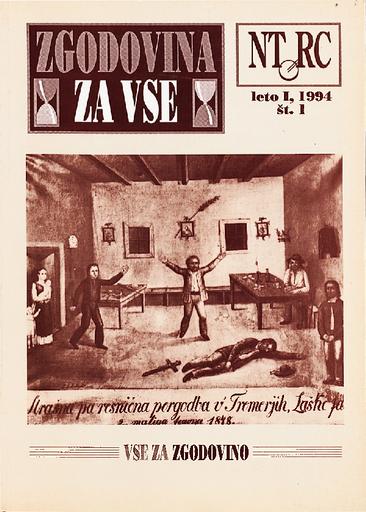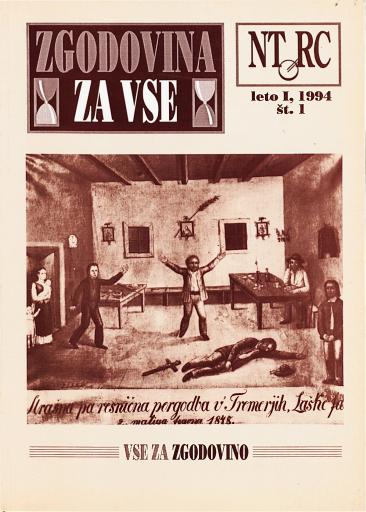
/
Periodicals
/
Zgodovina za vse
It Stank to High Heaven
On the History of Sanitary Conditions in Ljubljana before the First World War


This work by Andrej Studen is licensed under Creative Commons Attribution-NonCommercial-NoDerivs 4.0 International
Files (1)

Description
In his treatise, the author discusses the processes of hygienisation which were under way in the town of Ljubljana at the end of the 19th century. In the period before the earthquake of 1895, filth and stench, writes the author, reigned in Ljubljana. The housing conditions of the lower, and partly also of the middle social strata, were very unsuitable and unhealthy. The post-earthquake or Hribar's Ljubljana (named after Hribar, who was mayor of the city from 1896- 1910), was characterised by its numerous campaigns against filth and the new notions in the field of town hygiene it introduced - in particular the concepts of waterworks and a sewage system, along with detailed construction regulations, more rigorous control of the Sanitary Inspectorate (German: Stadtphysikat) and stricter enforcement of penalties for offenders in the form of fines or gaol sentences. However, numerous examples from every day life at the time indicate that some pre-earthquake customs, habits and conditions in the field of hygiene survived nonetheless. These were, through social education, only replaced gradually by more wholesome customs in the post-earthquake period.
Metadata (12)
- identifierhttps://hdl.handle.net/11686/2705
- title
- Smrdelo je kot kuga
- K zgodovini higienskih razmer v Ljubljani pred prvo svetovno vojno
- It Stank to High Heaven
- On the History of Sanitary Conditions in Ljubljana before the First World War
- Es stank wie die Pest
- Zur Geschichte der hygienischen Verhältnisse in Ljubljana (Laibach) vor dem Ersten Weltkrieg
- creator
- Andrej Studen
- contributor
- Janez Cvirn (ur.)
- subject
- civilizacija
- higienske razmere
- Ljubljana
- kulturna zgodovina
- cultural history
- sanitary conditions
- Ljubljana
- World War I
- description
- In his treatise, the author discusses the processes of hygienisation which were under way in the town of Ljubljana at the end of the 19th century. In the period before the earthquake of 1895, filth and stench, writes the author, reigned in Ljubljana. The housing conditions of the lower, and partly also of the middle social strata, were very unsuitable and unhealthy. The post-earthquake or Hribar's Ljubljana (named after Hribar, who was mayor of the city from 1896- 1910), was characterised by its numerous campaigns against filth and the new notions in the field of town hygiene it introduced - in particular the concepts of waterworks and a sewage system, along with detailed construction regulations, more rigorous control of the Sanitary Inspectorate (German: Stadtphysikat) and stricter enforcement of penalties for offenders in the form of fines or gaol sentences. However, numerous examples from every day life at the time indicate that some pre-earthquake customs, habits and conditions in the field of hygiene survived nonetheless. These were, through social education, only replaced gradually by more wholesome customs in the post-earthquake period.
- Der Autor behandelt in dem Artikel die Hygienisierangsprozesse, von denen Ljubljana Ende des vorigen Jahrhunderts erfaßt wurde. Von den hygienischen Verhältnissen in der provinziellen Kleinstadt, was Ljubljana im vorigen Jahrhundert war, kann sich der heutige Beobachter nur schwer eine Vorstellung machen. In der Zeit vor dem Erdbeben (vor 1895) breiteten sich in der Stadt Unrat und Gestank aus. Die Stadt schmückten unsachgemäß gebaute und schlechte Senkgruben, schmutzige und stinkende Straßenkanäle, die in den Ljubljanica-Huß geleitet wurden, schmale und nicht überdachte "Communegäßchen" sowie zahlreiche vernachlässigte Aborte mit Holzrohren und des öfteren sogar mit freiem Fall ("Plumpsklosett"). Die Entleerung der Senkgruben und der Aborte wurde nachlässig und oberflächlich durchgeführt. Bevor Ljubljana eine Wasserleitung bekam (errichtet wurde sie 1890), hatten seine Einwohner das Trinkwasser aus privaten und öffentlichen Brunnen und Quellen im Umkreis der Stadt geschöpft. Das Trinkwasser aus nicht angemessenen Brunnen war häufig zu beanstanden und gesundheitsschädlich. Sehr bescheiden, unangemessen und ungesund waren auch die Wohnverhältnisse der Unter- und zum Teil auch der Mittelschicht. Nach Ansicht des Stadtphysikers Dr. Viljem Kovač (1875) sollte eine gesunde Wohnung nicht feucht sein, darin sollten frische Luft, genügend Licht und eine angemessene Temperatur sein. Im damaligen Ljubljana fehlte es an solchen Wohnungen, doch war Dr. Kovač der Meinung, "die Mehrheit der Leute ist aufgrund ihres Nichtwissens bzw. ihrer Gewohnheiten aus der Jugend an die schädlichen Verhältnisse, die von ihrer Unterkunft herrühren, derart gewöhnt, daß sie die unangemessene Wohnung, die viele Mängel aufweist und wo sie von Krankheiten aller Art befallen werden, als gegebenen Zufall und unausweichliches Unglück hinnehmen." Der wachsende Pauperismus zwang die ärmsten Familien, sich in überfüllten, billigen, häufig dunklen und feuchten Räumen von Keller-, Dach- oder auf den Hof liegenden Wohnungen zu drängen. Die schlechten Wohnverhältnisse erwiesen sich natürlich auch bei Cholera-, Pocken- und Diphterieepidemien als verhängnisvoll, weil wegen Uberfüllung dieser Wohnungen und Platzmangel eine Isolierung der Kranken unmöglich war. Die zahlreichen Epidemien (insbesondere Cholera), die im vorigen Jahrhundert Ljubljana bedrängten, trugen am meisten zu seiner Hygienisierung bei und gaben Anregung zur Modernisierung der Stadt in der Zeit nach dem Erdbeben (nach 1895). In der Vorerdbebenzeit wurden alle akuten Fragen, die die unerträglichen hygienischen Verhältnisse betrafen, von der Stadtgemeinde nur von Zeit zu Zeit, nicht ernsthaft und bloß akademisch behandelt. Die Stadtväter lösten die Problematik der Stadthygiene zu langsam und unwirksam. Zahlreiche Anti-Schmutz-Kampagnen, Neuheiten im Bereich der Stadthygiene (insbesondere Wasserleitung und Kanalisation), genauere und sorgfältigere Bauvorschriften, verschärfte Aufsicht des Stadtphysikats und ein resoluteres Vorgehen gegen die Gesetzesbrecher (Bußgeld bzw. Gefängnis) sind charakteristisch für das Ljubljana nach dem Erdbeben, das von seinem Bürgermeister Ivan Hribar (1896-1910) geprägt wird. Die Stadtgemeinde betonte immerfort, das Volk müsse sich endlich an Sauberkeit gewöhnen. Ihr Wunsch war ein neues, größeres und moderneres Ljubljana. Für Ljublanas Stadthygiene war die Zeit nach dem Erdbeben in der Tat eine Zeit des Fortschritts, obwohl einige Bräuche, Gewohnheiten und Zustände aus vergangenen Zeiten erhalten blieben (was der Autor des Artikels anhand von vielen Beispielen aus dem Alltag gezeigt hat). Infolge gesellschaftlicher Umerziehung durch verschärfte Aufsicht und Bestrafung verschwanden sie langsam vom Alltagsschauplatz der Stadt. Nur die begüterten Einwohner Ljublanas konnten sich den Fortschritt leisten (z. B. WC, Bad), während sich die ärmeren mit schlechten hygienischen Verhältnissen und Bedingungen abfinden mußten. Die Wohnungsnot, die nach dem Zerfall der Monarchie durch eine neue Urbanisationswelle noch größere Ausmaße annahm, stellte für die Stadtgemeinde (trotz etlicher Bestrebungen) ein beinahe unlösbares Problem dar.
- publisher
- Zgodovinsko društvo
- date
- 1994
- type
- besedilo
- language
- Slovenščina
- isPartOf
- rights
- license: ccByNcNd
Citirano v (2)
| Tipologija | Avtor(ji) | Naslov | Kraj | Založba | Leto |
|---|---|---|---|---|---|
| 1.01 Izvirni znanstveni članek | Žerjal, Borut ; Čebron Lipovec, Neža | Società cooperativa per la costruzione di case in Capodistria : primer ljudske gradnje v Kopru | Koper | Zgodovinsko društvo za južno Primorsko : Znanstveno raziskovalno središče Republike Slovenije | 2016 |
| 1.01 Izvirni znanstveni članek | Bratož, Urška | Natrpana domovanja in druge grožnje zdravju: razprave o higienizaciji v Avstrijskem primorju ob koncu 19. stoletja | Ljubljana | Inštitut za novejšo zgodovino | 2024 |